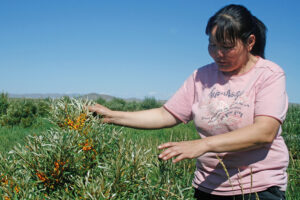Food sovereignty and resilience to climate change in rural Mongolia
Number of beneficiaries : 3200 people
Project duration : 3 years
Place : Khishig-Undur village (Bulgan province), Mongolia
Local partner
The Ecosoum association was created in 2018 and immediately embarked on its first project, dedicated to improving the management of household waste.
Since then, Ecosoum has also been developing:
- an agricultural project aimed at supporting and developing local organic farming,
- Another project aimed at strengthening artisanal production capacities of local goods and services useful to the population.
These projects are all carried out with a view to increasing local resilience, particularly in the face of climate change.
The Ecosoum association is particularly legitimate in the implementation of its projects because it is made up exclusively of inhabitants of the villages where the projects take place and it benefits from the formal recognition of local authorities in the implementation of such projects. Ecosoum also counts among its associative members based in Ulan Bator many volunteers with expertise in areas related to climate change issues (architect specializing in energy efficiency, water and environment engineers, etc.).
In addition, this is a project that is perfectly consistent with the mandate and other projects of the association (waste management, sustainable agriculture and breeding, etc.), all of which aim to fight for the protection of environment and against climate change.

Context
If Mongolia is historically self-sufficient in meat and dairy products due to its ancestral extensive pastoralism, this is far from the case with regard to vegetables and fruits.
As in most of the country, the soum (village) of Khishig-Undur, where two thirds of the families are nomadic herders, is experiencing a serious problem of overgrazing, which contributes to a worrying phenomenon of desertification of the steppes. It should also be mentioned that forest management is relatively poor in Khishig-Undur. In fact, forest areas are constantly decreasing and now represent only 8% of the total area of the soum (32,300 ha out of 245,500 ha), a comparable figure for the whole of Mongolia.
Khishig-Undur is located about 300 km (both paved and dirt roads) from the capital Ulaanbaatar, where most of the goods and food, including almost all vegetables, come from. imported from abroad or produced in other regions of Mongolia.
National under-production of vegetables and the lack of food sovereignty have been well-identified problems for decades. The difficulties faced by farmers have increased with the effects of climate change. In addition, the Covid crisis and movement restrictions during the year 2020 and the first half of 2021 have highlighted the extent of specific food-related issues facing isolated soums like Khishig-Undur: As the transport of goods from the capital Ulaanbaatar dwindled in number and increased in price, the supply of vegetables was a struggle, and demand far exceeded not only local production but also imported supply. This situation is very likely to worsen in the future.
The mission
General objective: Improve food sovereignty and the resilience of Mongolian rural communities to climate change through the development of local agro-ecological production of vegetables and fruits
Specific objective: Increase the production and conservation of vegetables and fruits in Khishig-Undur
Activities
- Establishment of a community agro-park of 6.2 ha to gradually produce enough vegetables locally to supply the entire population of the soum, training of local farmers
- Establishment of a 10 ha community orchard to create new sustainable jobs and strengthen the resilience of communities to climate change, practical training of beneficiary households
- Rehabilitation of an efficient community cellar and development of the processing of vegetables and fruits allowing conservation all year round and supplying the population of the soum, training of households on food conservation
Beneficiaries
The project reaches 3,200 people, i.e. the total population of the village of Khishig-Undur, for food sovereignty and resilience to climate changesince all inhabitants will directly benefit from better access to good local vegetables and fruits.
More specifically, the project benefits:
- 5 to 10 families involved in the agricultural agro-park
- 12 “amateur gardeners” families
- 20 families involved in the cultivation of the orchard.
